W.S.L.C.
WSLC Convention shifts its focus to racism, organizing
Delegates urged to change how unions do business to survive, thrive in Trump era
VANCOUVER, Wash. (July 19, 2017) — If Tuesday’s session of the 2017 Convention of the Washington State Labor Council, AFL-CIO was a time for inspiration and even celebration, Wednesday’s plenary session was a time for introspection. What are unions doing right and what are they doing wrong? What do they need to do differently to meet the extraordinary challenges faced amid attacks by the Trump administration and right-wing billionaire-funded foundations?
One is to acknowledge that racism continues to be pervasive in America, including within our unions, and that the forces who oppose organized labor continue to stoke those flames to drive apart, and therefore weaken, communities of working people.
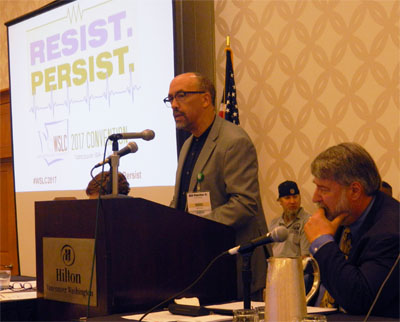 “When you have a section of the working class that — no matter how poor, oppressed, and victimized it is — thinks it has more in common with Donald Trump and Koch brothers than (their own community), you’ve got a hell of a problem,” said author/commentator Bill Fletcher, Jr. “Or to put it in terms of the rich, you’ve got a hell of a solution.”
“When you have a section of the working class that — no matter how poor, oppressed, and victimized it is — thinks it has more in common with Donald Trump and Koch brothers than (their own community), you’ve got a hell of a problem,” said author/commentator Bill Fletcher, Jr. “Or to put it in terms of the rich, you’ve got a hell of a solution.”
Over the past two years, Fletcher has worked with the WSLC to create and begin conducting workshops to tackle racial justice issues head-on with union members in Washington state. He congratulated WSLC President Jeff Johnson, Secretary Treasurer Lynne Dodson, and the council’s staff and affiliates for taking on this critical issue. In his status report on those efforts, Fletcher said the focus is on “how to beat back attacks that are devastating and pulverizing the working class. It’s not just a training, it’s a dialogue. It’s an experience.”
“Like any discussion of race, it is troubling for some people,” he said. But Fletcher warned that once you’ve learned how the ruling classes have deliberately used racism for centuries to divide and conquer the working class — and enrich themselves — that puts you at a fundamental moral crossroads: either you do something about it, or you remain silent.
“It’s not enough to be silent. In fact, silence is complicity,” Fletcher said. “Standing still is failure. And, as the saying goes, failure is not an option.”
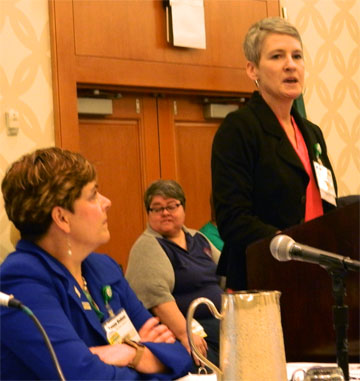 On Wednesday, convention delegates also heard from MaryBe McMillan, Secretary Treasurer of the North Carolina AFL-CIO, who has become a national leader by challenging organized labor to take a different tack on union organizing. Rather than ceding the South to the anti-labor forces prevalent there — which has led to a low-wage powerless workforce exploited by corporations like Boeing — we must aggressively organize there, especially as the region grows and has more and more political power.
On Wednesday, convention delegates also heard from MaryBe McMillan, Secretary Treasurer of the North Carolina AFL-CIO, who has become a national leader by challenging organized labor to take a different tack on union organizing. Rather than ceding the South to the anti-labor forces prevalent there — which has led to a low-wage powerless workforce exploited by corporations like Boeing — we must aggressively organize there, especially as the region grows and has more and more political power.
“Things in this country are definitely going South,” McMillan joked. “But the good news is, it does not have to be this way. We are not doomed to low wages. We can stop the race to the bottom. But we must organize. We can change the future if more unions invest in organizing, especially in the South.”
She said organized labor must change its ways to survive amid union-weakening “right-to-work” laws pushed by Republicans throughout America.
“Right-to-work clearly hurts working people, but right-to-work can never mean right-to-surrender,” McMillan said. “We as a movement cannot accept as inevitable our demise. Our movement is in crisis, but at its heart, it is fundamentally a crisis of hope.”
Also Wednesday:
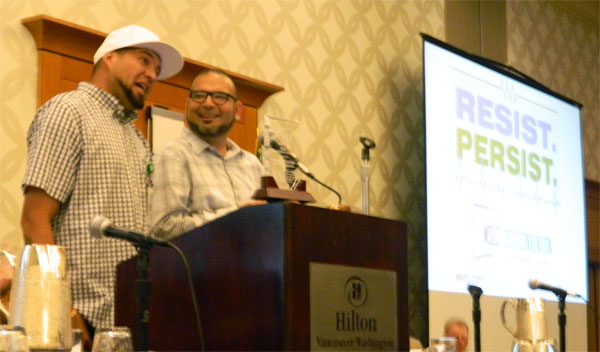 ► Delegates celebrated with leaders and members of Familias Unidas por la Justicia (FUJ), an independent and indigenous farm worker union with more than 500 members based in Burlington, Wash.. After a four-year campaign to organize berry pickers at Sakuma Brothers Farms, in June the FUJ ratified its first-ever collective bargaining agreement with the company. WSLC President Jeff Johnson presented the FUJ with his President’s Award to commemorate this historic achievement.
► Delegates celebrated with leaders and members of Familias Unidas por la Justicia (FUJ), an independent and indigenous farm worker union with more than 500 members based in Burlington, Wash.. After a four-year campaign to organize berry pickers at Sakuma Brothers Farms, in June the FUJ ratified its first-ever collective bargaining agreement with the company. WSLC President Jeff Johnson presented the FUJ with his President’s Award to commemorate this historic achievement.
FUJ President Ramon Torres thanked the WSLC and the unions gathered in Vancouver this week for their support throughout that effort, and urged all to help get the word out to buy union-made Sakuma berries — including those sold as Driscoll’s — now that the workers now have the tools to make sure they get fair wages and safe working conditions.
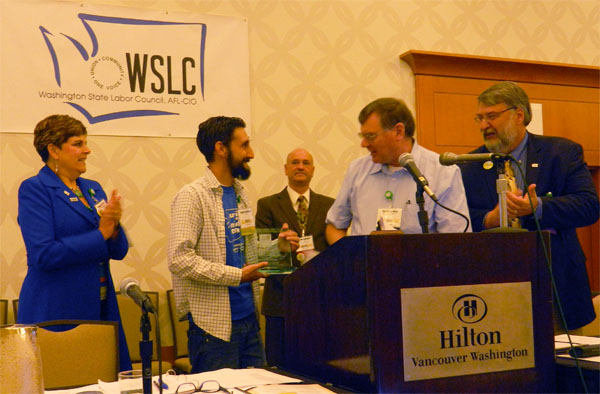 ► On a related note, the WSLC Economic Development and Transportation Committee presented its annual Mother Jones Award to Jason Holland, a staff member for Washington Public Employees Association/UFCW, for his tireless efforts to support FUJ’s organizing campaign at Sakuma Brothers Farms. Holland’s parents surprised him by attending Wednesday’s award presentation, a proud moment for that family.
► On a related note, the WSLC Economic Development and Transportation Committee presented its annual Mother Jones Award to Jason Holland, a staff member for Washington Public Employees Association/UFCW, for his tireless efforts to support FUJ’s organizing campaign at Sakuma Brothers Farms. Holland’s parents surprised him by attending Wednesday’s award presentation, a proud moment for that family.
The organizational Mother Jones award was presented to the leadership and members of the Association of Western Pulp and Paper Workers Local 155, representing employees at the Nippon plant in Port Angeles. That union has faced tremendous adversity, starting with a two-year contract bargaining that culminated in a strike that forced the company back to the table. But due to foreign competition, Nippon began slowing production and laying off workers in 2015 and this year, it announced the sale of the plant, which has disrupted the livelihoods of hundreds of AWPPW families in the area.
Throughout these challenges the union’s leadership has helped members manage a complicated system to access the resources they need to transition to new employment, while still maintaining morale.
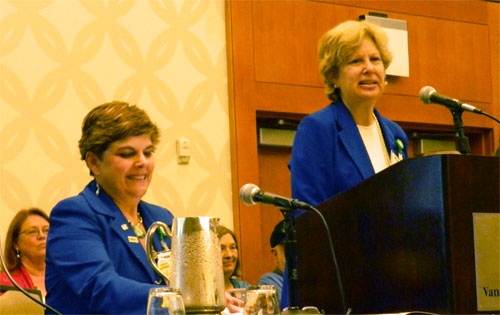 ► Nancy Altman, leader of Social Security Works, described the continuing threats to America’s most successful, effective and popular programs: Social Security. Although it’s one of the rare examples of a government program that’s popular among people of all political persuasions — from Tea Partiers to socialists — efforts to undermine and cut the program continue to occur, including in the budget recently proposed by Donald Trump.
► Nancy Altman, leader of Social Security Works, described the continuing threats to America’s most successful, effective and popular programs: Social Security. Although it’s one of the rare examples of a government program that’s popular among people of all political persuasions — from Tea Partiers to socialists — efforts to undermine and cut the program continue to occur, including in the budget recently proposed by Donald Trump.
“We are all agreed on this (the importance of Social Security), Altman said, “and it is time for the people who work for us in Washington, D.C., and whose salaries we pay, to start doing what we want.”
“What we want” is to expand Social Security and increase its relatively modest benefits by raising or scrapping the cap that allows the wealthiest Americans to keep most of their income exempt from Social Security taxes.
► A panel that included the WSLC staffer April Sims, Judy Twedt of UAW 4121, and Matthew Hepner of IBEW laid out the immediate threat and challenge of climate change, and urged delegates to join the campaign to make Washington state a national leader in the transition to a clean-energy economy with good-paying jobs. A likely 2018 ballot measure will outline new state policies to promote a “just transition” for workers and communities most impacted by climate change, and delegates were urged to join that effort by becoming Climate Justice Stewards.
“To change everything, it’s going to take everyone,” Sims said.
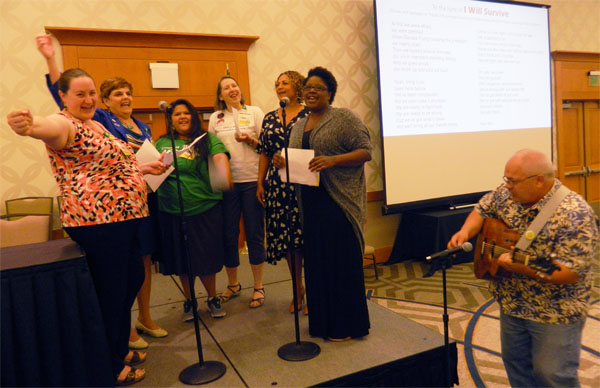
WSLC Secretary Treasurer Lynne Dodson (second from left) and WSLC Vice President Vance Lelli (on guitar) lead an impromptu choir in singing a rewritten version of Gloria Gaynor’s “I Will Survive” on Wednesday.
► At Wednesday night’s convention banquet, two more awards were presented.
The WSLC Education, Training and Apprenticeship Committee honored T. Paul Schell of IBEW Local 77 with the Bruce Brennan Award for his extraordinary contributions to advancing education and apprenticeship in the state labor movement.
The WSLC Women’s Committee presented its annual Elsie Schrader Award to Joan Weiss, Labor Liaison for the community and technical colleges in King County, for decades of successfully recruiting union members and leaders to take active roles in the committees and boards governing those colleges. The Elsie Schrader Award honors the advancement of women in leadership roles and/or for activism on behalf of women within the labor movement.
The convention concludes Thursday following action on resolutions and political endorsements. The results of that work will soon be posted at www.wslc.org.





